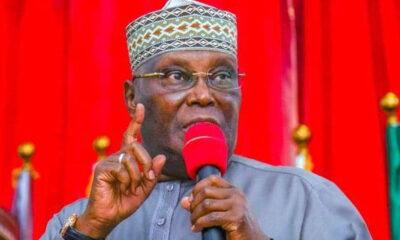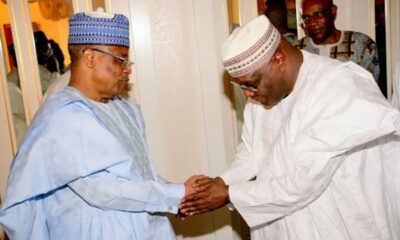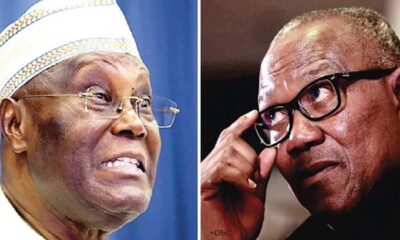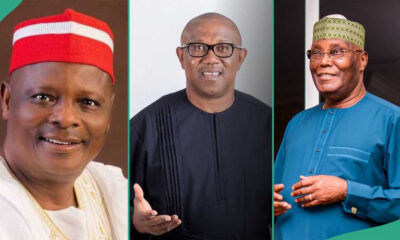Opinion
Ignorance of America that Atiku’s lawyers and supporters betray – Farooq Kperogi

Ignorance of America that Atiku’s lawyers and supporters betray – Farooq Kperogi
As I have stressed repeatedly, I have no partisan emotional investment in the political brawl between President Bola Ahmed Tinubu and former Vice President Atiku Abubakar, or in who is and is not president of Nigeria. My only partisan affinity is with the truth or, to reecho iconic Washington Post reporter Carl Bernstein, the best obtainable version of the truth.
This intervention is for people who genuinely want clarity from the blinding maze of propaganda and intentional falsehoods flying around. It’s not for sentimental partisan hacks and political devotees who just want an affirmation of and a comfort to their prejudices and preconceptions.
As an American citizen, a graduate of two American universities, and a professor in one, I can tell the reader three major things Atiku’s Nigerian lawyers and his supporters on social media— and in some openly partisan news sites— are getting wrong.
The major one is the idea that because Tinubu presented a certificate (called a “diploma” in America) to INEC that didn’t emanate from Chicago State University, whose registrar affirmed under oath that Tinubu graduated from there, he has committed forgery in the legal sense of the term. That thinking betrays ignorance of the American university system—and results from people using their limited Nigerian lenses to refract an American phenomenon that’s beyond their experiential reality.
Certificates are not used as legal proof of graduation from any school in America and therefore can’t be forged in the legal sense of the term. Only transcripts can be used as legal documents to validate the genuineness of claims to have attended institutions, including secondary schools.
Had Tinubu presented a counterfeit transcript to support his claim of graduating from CSU when he didn’t, or merely to claim a higher GPA than he actually earned even when he graduated from there, that would have been forgery in the legal sense of the term, which is understood to mean “Criminal falsification by making or altering an instrument with intent to defraud.”
READ ALSO:
-
Ondo pastor in court for threatening to kill magistrate
-
Sagamu: Police inspector, guards shot during shoot-out with rampaging armed robbers
-
Alleged N130m fraud: Court orders arraignment of property developer for alleged harassment, threat to life
In this context, “intent to defraud” would mean Tinubu wanted to pass himself off as a university graduate when he wasn’t. But he is. His transcript says he is. The registrar of the university said under oath that he is. A classmate of his said under oath that they graduated from the school the same year. That’s all that matters.
One indication of the legal worthlessness of certificates in America came from the CSU registrar’s admission in court that the school had many uncollected diplomas going as far back as the 1930s. Certificates are not required to prove graduation here. That’s why people can afford to ignore them.
Intriguingly, the registrar said Tinubu also didn’t collect his original certificate from the school and that it is still lying there. Why did he say he lost it?
In the United States, a certificate is in many ways similar to a graduation ceremony. Most people attend it and listen to the president of the university formally confer diplomas on them with “all the rights and privileges pertaining thereto.” But it has no force of law. Not attending a graduation ceremony doesn’t deprive you of “all the rights and privileges pertaining thereto.”
If you organize your own graduation ceremony, invite friends and family, and ask your father to confer your degree on you, it’s fine so long as you validly earned the degree. Incidentally, an American family friend of mine did exactly that last May. His autistic son can’t tolerate the sensory overload of large crowds. So, he organized his son’s graduation and invited friends and family. He dressed as the president, and his wife was the provost. His eldest daughter was the graduation speaker.
In America, the diploma is the printed version—or fixed extension—of a graduation ceremony. It’s merely ceremonial and can be tweaked or individualized by anyone without legal consequences.
It betrays a stupendous poverty of legal and logical imagination to say that the “forgery” (unauthorized redesign is a better expression) of a non-legally-binding ceremonial document of a validly earned degree invalidates the degree. It’s never mentioned in CSU’s diplomas that alteration of the documents renders them invalid because they have no validity beyond being decorative documents.
You find that kind of language here only on transcripts. On Tinubu’s CSU transcript, for instance, we find such legal language twice. The left-hand side of the transcript says, “Explanatory legend and authenticity confirmation information on back.” On the right-hand side, it says, “THIS RECORD IS NOT OFFICIAL UNLESS IT BEARS A SIGNATURE AND SEAL OF THE UNIVERSITY.”
The diploma does not have such language because in America the diploma is no more important than a school’s academic gown. For example, I use a cheaper, “forged” version of the academic gown of the university that awarded me a doctoral degree (that I ordered from a third-party vendor online) to attend graduation ceremonies at the school where I teach now. At the time I graduated with my doctoral degree, I could only afford to rent the gown. Most people here do the same. It doesn’t invalidate our degrees because we’re using the unofficial academic gown of our universities.
I admit, though, that Tinubu was careless. He is in Nigeria where certificates have a different meaning and valence from the United States. He should have submitted CSU’s official diploma to INEC. But what he did does not, by even the most feverish stretch of conspiratorial fantasy, rise to the level of a Salisu-Buhari-type criminal forgery.
READ ALSO:
- Customs intercepts 8 truck-loads of foreign rice, other items worth N1.76bn
-
BREAKING: More troubles for Naira Marley as court asks EFCC to produce him for Internet fraud trial
-
(BREAKING) Abia : Labour Party jubilates as tribunal upholds Gov Alex Otti’s election
Unlike Salisu Buhari who forged a University of Toronto degree that he didn’t earn, Tinubu attended and earned a degree from Chicago State University. What Tinubu did with his certificate is pointlessly self-harming in reputational terms in Nigeria, but it’s not illegal.
The second major misconception of America came from Atiku’s lawyer by the name of Kalu Kalu. He said at a news conference on October 5 that “the Chicago State University admission application form has a claim that… the owner of that document is a Black American, and the document Bola Ahmed Tinubu submitted to INEC, he denied having dual citizenship which means it doesn’t belong to him.”
I’m sorry, but I couldn’t help myself from letting out a burst of deep, loud, hearty laughter when I read that. It’s pure hilarious ignorance! You see, America has an enduringly irresistible impulse to taxonomize humanity into discrete racial categories. Every official form here requests you to identify your race. The modern options are “White, Black or African American, American Indian or Alaska Native, Asian, and Native Hawaiian or Other Pacific Islander.”
In the mid-1970s when Tinubu applied to study at CSU, what is now “Black or African American” on official forms in America was simply “Black American,” particularly in historically Black Universities like CSU.
The US Census Bureau has historically defined “Black or African American” as “A person having origins in any of the Black racial groups of Africa.”
“Black American” was the only category that closely applied to Tinubu, so he chose it because the form instructed him to “CHECK ONE BOX.” Checking the “Black American” box didn’t mean he called himself a Black American or that he impersonated a Black American. It only meant he identified HIS RACE as “Black American.” No more, no less.
The other options in the form were barely decipherable, but I could pick out “American Indian or Alaska Native,” something that looks like “Spanish Surname American,” another that looks like “Eurasian American,” etc. Although the form gave the option for “Other (explain),” most Africans here typically choose Black American as the closest description of their race.
Finally, a Dr. Abimbola Adenike Tinubu, who lives in a small town called Opelousas in the state of Louisiana, is being touted by social media trolls as the woman whose identity Bola Tinubu allegedly stole. The problem is that the lady was born in 1971, just 4 years before Tinubu enrolled at Southwest College. She graduated from the University of Ilorin in 1998 and came to the US later.
It’s chronologically and rationally impossible for Tinubu to steal the identity of a 4-year-old Nigerian preschooler (who came to America decades after Tinubu left it) and then present himself as an adult male to enroll at a community college!
Plus, Dr. Abimbola’s Whitepages information shows that she has never lived in Virginia where the social security number associated with President Tinubu was issued or Chicago where he went to school. She has only lived in Tennessee, Texas, and Louisiana.
Look, Tinubu’s life is wrapped in multiple layers of mind-bogglingly intricate fraud, but you can’t peel off these layers of fraud with fraud. You do it with the truth.
And Atiku can actually inflict fatal moral wounds on Tinubu and potentially immobilize him in 2027 if he pursues the leads that came out from his “fishing expedition” in Chicago. A low-hanging fruit is Tinubu’s obviously fraudulent secondary school attendance claim.
He can write to Cambridge University to verify the GCE A-level result that Tinubu presented to Southwest College. If it turns out that it’s fake or belongs to someone else, he can cause Daley College to rescind his associate degree.
If his associate degree is rescinded, his bachelor’s degree from Chicago State University will automatically follow. With no qualifications to present to INEC to prove that he has at least the equivalent of a secondary school certificate, he’d be legally ineligible to run again.
Ignorance of America that Atiku’s lawyers and supporters betray – Farooq Kperogi
Opinion
El Rufai’s Arise News mind game with Ribadu, By Farooq Kperogi

El Rufai’s Arise News mind game with Ribadu, By Farooq Kperogi
El Rufai’s Arise News mind game with Ribadu, By Farooq Kperogi
Opinion
Oshiomhole: Behold the 13th disciple of Christ

Oshiomhole: Behold the 13th disciple of Christ
Opinion
AFCON 2025: Flipping Content Creation From Coverage to Strategy

AFCON 2025: Flipping Content Creation From Coverage to Strategy
By Toluwalope Shodunke
The beautiful and enchanting butterfly called the Africa Cup of Nations (AFCON) emerged from its chrysalis in Khartoum, Sudan, under the presidency of Abdelaziz Abdallah Salem, an Egyptian, with three countries—Egypt, Sudan, and Ethiopia—participating, and Egypt emerging as the eventual winner.
The reason for this limited participation is not far-fetched. At the time, only nine African countries were independent. The remaining 45 countries that now make up CAF’s 54 member nations were either pushing Queen Elizabeth’s dogsled made unique with the Union Jack, making supplications at the Eiffel Tower, or knocking at the doors of the Palácio de Belém, the Quirinal Palace, and the Royal Palace of Brussels—seeking the mercies of their colonial masters who, without regard for cultures, sub-cultures, or primordial affinities, divided Africa among the colonial gods.
From then until now, CAF has had seven presidents, including Patrice Motsepe, who was elected as the seventh president in 2021. With more countries gaining independence and under various CAF leaderships, AFCON has undergone several reforms—transforming from a “backyard event” involving only three nations into competitions featuring 8, 16, and now 24 teams. It has evolved into a global spectacle consumed by millions worldwide.
Looking back, I can trace my personal connection to AFCON to table soccer, which I played alone on concrete in our balcony at Olafimihan Street—between Mushin and Ilasamaja—adjacent to Alafia Oluwa Primary School, close to Alfa Nda and Akanro Street, all in Lagos State.
Zygmunt Bauman, the Polish-British sociologist who developed the concept of “liquid modernity,” argues that the world is in constant flux rather than static, among other themes in his revelatory works.
For the benefit of Millennials (Generation Y) and Generation Z—who are accustomed to high-tech pads, iPhones, AI technologies, and chat boxes—table soccer is a replica of football played with bottle corks (often from carbonated drinks or beer) as players, cassette hubs as the ball, and “Bic” biro covers for engagement. The game can be played by two people, each controlling eleven players.
I, however, enjoyed playing alone in a secluded area, running my own commentary like the great Ernest Okonkwo, Yinka Craig, and Fabio Lanipekun, who are all late. At the time, I knew next to nothing about the Africa Cup of Nations. Yet, I named my cork players after Nigerian legends such as Segun Odegbami, Godwin Odiye, Aloysius Atuegbu, Tunji Banjo, Muda Lawal, Felix Owolabi, and Adokiye Amiesimaka, among others, as I must have taken to heart their names from commentary and utterances of my uncles resulting from sporadic and wild celebrations of Nigeria winning the Cup of Nations on home soil for the first time.
While my connection to AFCON remained somewhat ephemeral until Libya 1982, my AFCON anecdotes became deeply rooted in Abidjan 1984, where Cameroon defeated Nigeria 3–1. The name Théophile Abéga was etched into my youthful memory.
Even as I write this, I remember the silence that enveloped our compound after the final whistle.
It felt similar to how Ukrainians experienced the Battle of Mariupol against Russia—where resolute resistance eventually succumbed to overwhelming force.
The Indomitable Lions were better and superior in every aspect. The lion not only caged the Eagles, they cooked pepper soup with the Green Eagles.
In Maroc ’88, I again tasted defeat with the Green Eagles (now Super Eagles), coached by the German Manfred Höner. Players like Henry Nwosu, Stephen Keshi, Sunday Eboigbe, Bright Omolara, Rashidi Yekini, Austin Eguavoen, Peter Rufai, Folorunsho Okenla, Ademola Adeshina, Yisa Sofoluwe, and others featured prominently. A beautiful goal by Henry Nwosu—then a diminutive ACB Lagos player—was controversially disallowed.
This sparked outrage among Nigerians, many of whom believed the referee acted under the influence of Issa Hayatou, the Cameroonian who served as CAF president from 1988 to 2017.
This stroll down memory lane illustrates that controversy and allegations of biased officiating have long been part of AFCON’s history.
The 2025 Africa Cup of Nations in Morocco, held from December 21, 2025, to January 18, 2026, will be discussed for a long time by football historians, raconteurs, and aficionados—for both positive and negative reasons.
These include Morocco’s world-class facilities, the ravenous hunger of ball boys and players (superstars included) for the towels of opposing goalkeepers—popularly dubbed TowelGate—allegations of biased officiating, strained relations among Arab African nations (Egypt, Algeria, Tunisia, and Morocco), CAF President Patrice Motsepe’s curt “keep quiet” response to veteran journalist Osasu Obayiuwana regarding the proposed four-year AFCON cycle post-2028, and the “Oga Patapata” incident, where Senegalese players walked off the pitch after a legitimate goal was chalked off and a penalty awarded against them by DR Congo referee Jean-Jacques Ndala.
While these narratives dominated global discourse, another critical issue—less prominent but equally important—emerged within Nigeria’s media and content-creation landscape.
Following Nigeria’s qualification from the group stage, the Super Eagles were scheduled to face Mozambique in the Round of 16. Between January 1 and January 3, Coach Eric Chelle instituted closed-door training sessions, denying journalists and content creators access, with media interaction limited to pre-match press conferences.
According to Chelle, the knockout stage demanded “maximum concentration,” and privacy was necessary to protect players from distractions.
This decision sparked mixed reactions on social media.
Twitter user @QualityQuadry wrote:
“What Eric Chelle is doing to journalists is bad.
Journalists were subjected to a media parley under cold weather in an open field for the first time in Super Eagles history.
Journalists were beaten by rain because Chelle doesn’t want journalists around the camp.
Locking down training sessions for three days is unprofessional.
I wish him well against Mozambique.”
Another user, @PoojaMedia, stated:
“Again, Eric Chelle has closed the Super Eagles’ training today.
That means journalists in Morocco won’t have access to the team for three straight days ahead of the Round of 16.
This is serious and sad for journalists who spent millions to get content around the team.
We move.”
Conversely, @sportsdokitor wrote:
“I’m not Eric Chelle’s biggest supporter, but on this issue, I support him 110%.
There’s a time to speak and a time to train.
Let the boys focus on why they’re in Morocco—they’re not here for your content creation.”
From these three tweets, one can see accessibility being clothed in beautiful garments. Two of the tweets suggest that there is only one way to get to the zenith of Mount Kilimanjaro, when indeed there are many routes—if we think within the box, not outside the box as we’ve not exhausted the content inside the box.
In the past, when the economy was buoyant, media organisations sponsored reporters to cover the World Cup, Olympics, Commonwealth Games, and other international competitions.
Today, with financial pressures mounting, many journalists and content creators seek collaborations and sponsorships from corporations and tech startups to cover sporting events, who in turn get awareness, brand visibility, and other intangibles.
As Gary Vaynerchuk famously said, “Every company is a media company.” Yet most creators covering AFCON 2025 followed the same playbook.
At AFCON 2025, most Nigerian journalists and content creators pitched similar offerings: on-the-ground coverage, press conferences, team updates, behind-the-scenes footage, analysis, cuisine, fan interactions, and Moroccan cultural experiences.
If they were not interviewing Victor Osimhen, they were showcasing the stand-up comedy talents of Samuel Chukwueze and other forms of entertainment.
What was missing was differentiation. No clear Unique Selling Proposition (USP). The result was generic, repetitive content with little strategic distinction. Everyone appeared to be deploying the same “Jab, Jab, Jab, Hook” formula—throwing multiple jabs of access-driven content in the hope that one hook would land.
The lesson is simple: when everyone is jabbing the same way, the hook becomes predictable and loses its power.
As J. P. Clark wrote in the poem “The Casualties”, “We are all casualties,” casualties of sameness—content without differentiation. The audience consumes shallow content, sponsors lose return on investment, and creators return home bearing the “weight of paper” from disappointed benefactors.
On November 23, 1963, a shining light was dimmed in America when President John F. Kennedy was assassinated.
As with AFCON today, media organisations sent their best hands to cover the funeral, as the who’s who of the planet—and if possible, the stratosphere—would attend. Unconfirmed reports suggested that over 220 VVIPs were expected.
While every newspaper, radio, and television station covered the spectacle and grandeur of the event, one man, Jimmy Breslin, swam against the tide. He chose instead to interview Clifton Pollard, the foreman of gravediggers at Arlington National Cemetery—the man who dug John F. Kennedy’s grave.
This act of upended thinking differentiated Jimmy Breslin from the odds and sods, and he went on to win the Pulitzer Prize in 1986.
Until journalists and content creators stop following the motley and begin swimming against the tide, access will continue to be treated as king—when in reality, differentiation, aided by strategy, is king.
When every journalist and content creator is using Gary Vaynerchuk’s “Jab, Jab, Jab, Hook” template while covering major sporting events, thinkers among them must learn to replace one jab with a counterpunch—and a bit of head movement—to stay ahead of the herd.
Toluwalope Shodunke can be reached via tolushodunke@yahoo.com
-

 metro3 days ago
metro3 days agoIKEDC Sets Feb 20 Deadline for Customers to Submit Valid IDs or Face Disconnection
-

 Education3 days ago
Education3 days agoSupreme Court Affirms Muslim Students’ Right to Worship at Rivers State University
-

 metro2 days ago
metro2 days agoLagos Police Launch Manhunt for Suspect in Brutal Ajah Murder
-

 News2 days ago
News2 days agoAso Rock Goes Solar as Tinubu Orders National Grid Disconnection
-

 Business3 days ago
Business3 days agoNaira Could Trade Below ₦1,000/$ With Dangote Refinery at Full Capacity — Otedola
-

 metro3 days ago
metro3 days agoArmy University Professor Dies in Boko Haram Captivity After Nearly One Year
-

 International3 days ago
International3 days agoTrump Halts Minnesota Immigration Crackdown After Fatal Shootings, Protests
-

 Sports2 days ago
Sports2 days agoLookman Shines as Atlético Madrid Hammer Barcelona 4-0















